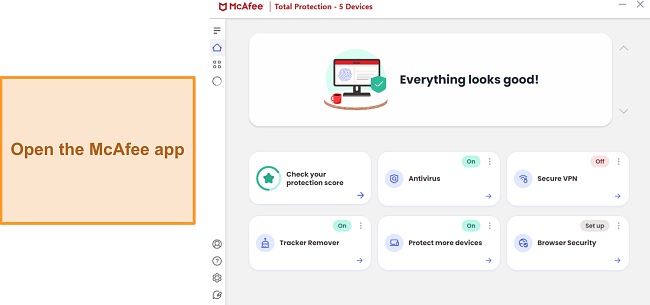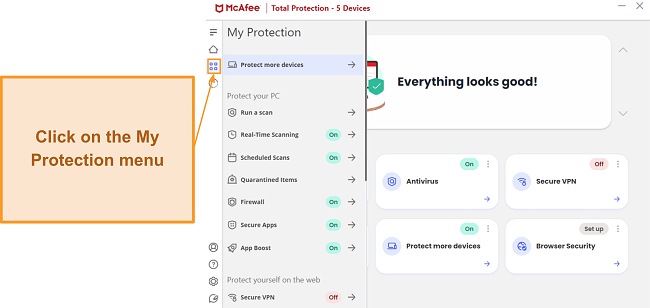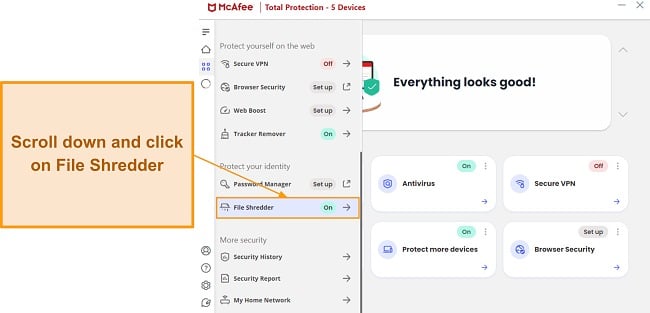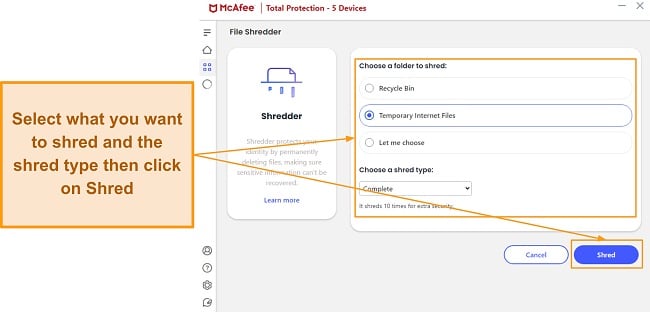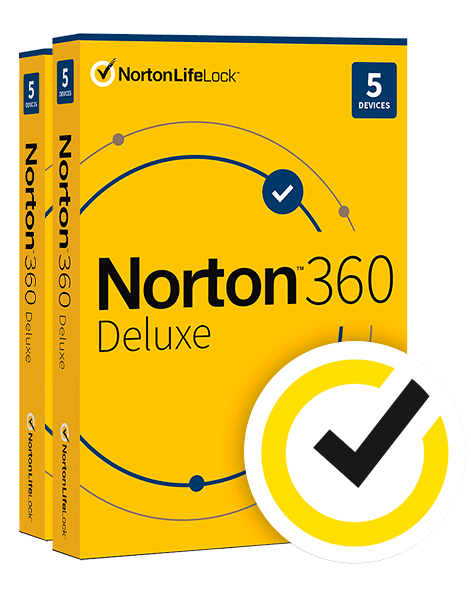ESET vs McAfee: Which Antivirus Is Best? [Tested 2024]
ESET and McAfee are two household names in the antivirus space and have been helping people secure their systems for decades. However, I wanted to learn which of these antiviruses is better overall, so I put them through a series of rigorous tests to find out.
During tests, I learned that both antiviruses do a flawless job of detecting and eliminating threats, but McAfee wins due to its rich feature set and better customer support. Each antivirus successfully caught and removed 100% of malware during scans.
I consider McAfee the superior overall choice, but you can try both antiviruses yourself to see which one is the right fit for you. McAfee and ESET both offer 30-day money-back guarantees that’ll let you test their features risk-free.
Try McAfee risk-free for 30 days!
No Time? Here’s a 1-Minute Summary of Category Winners
 |
||
| Virus Scanner | Detects and removes 100% of malware through scans | Successfully detects and eliminates 100% of malware via scans |
| Real-Time Malware Protection | Provides flawless protection against threats in real-time | Safeguards your system from 100% of real-time threats |
| System Performance | Can consume a lot of system resources while idle | Doesn’t impact system performance by a significant margin |
| VPN | Does not have a built-in VPN | Offers a built-in VPN you can use |
| Parental Controls | Effective but basic parental control suite | Feature-rich parental control suite |
| Firewall | A secure firewall that’s a bit challenging to configure | A secure and intuitive firewall that you can customize with ease |
| Password Manager | Intuitive and secure password manager to safeguard your sensitive data | Secure password manager for all your sensitive information |
| Gaming Mode | Built-in gaming mode that silences notifications | Doesn’t have a gaming mode |
| Optimization Tools | Doesn’t come with any noteworthy optimization tools | Offers various tools to optimize system performance |
| Other Features | Doesn’t offer many features other than its security | Comes with a variety of additional features that can assist you in many ways |
| Device Compatibility | Works on Windows, macOS, and Android | Works on Windows, macOS, Android, and iOS |
| Customer Service | Responsive customer support but live chat is only available during specific hours | Helpful customer support that’s available 24/7 |
| Price | Is well-priced but not necessarily the best value for money | Offers great value for money with all its plans |
| Free Trial | 30-day free trial that doesn’t require a credit card | 30-day free trial that requires a credit card |
| Money-Back Guarantee | 30-day money-back guarantee | 30-day money-back guarantee |
Try McAfee risk-free for 30 days
How I Tested and Compared ESET vs McAfee
- Virus Scanner — I checked how effectively both antiviruses detect and remove malware via scans.
- Real-Time Malware Protection — I tested if the antiviruses could safeguard my system from threats in real time.
- System Performance — I tested which antivirus has a lower impact on my system’s performance.
- VPN — I looked to see if the antiviruses offer built-in VPNs and whether they’re any good.
- Parental Controls — I analyzed the available parental controls in both antiviruses to see which one offers the more thorough parental control suite.
- Firewall — I checked to see if the antiviruses offer secure firewalls to keep you safe online.
- Password Manager — I made sure the antiviruses offer password managers and whether they’re good enough to store sensitive information.
- Gaming Mode — I tested both antiviruses’ gaming modes to see if they provide a worthwhile performance improvement while gaming.
- Optimization Tools — I checked if the antiviruses offer optimization tools and whether these tools deliver a noticeable improvement.
- Other Features — I tested the various other features in the antiviruses to see which one has more to offer.
- Device Compatibility — I researched which antivirus works on more devices than the other.
- Customer Service — I contacted both antiviruses’ customer support to see how quickly they respond and how helpful they are.
- Price — I compared the various pricing plans to see which antivirus offers more value for money.
- Free Trial — I looked to see if the antiviruses offer free trials and how long the trials are.
- Money-Back Guarantee — I reviewed both antiviruses’ money-back guarantees to see which one is more reliable.
Try McAfee risk-free for 30 days
1. Virus Scanner — Both Antiviruses Successfully Detect 100% Of Malware
McAfee’s virus scanning options include a Quick Scan and a Full Scan. There’s no Custom Scan option in the app like ESET has, but this isn’t an issue because you can right-click and scan any folder you want to.
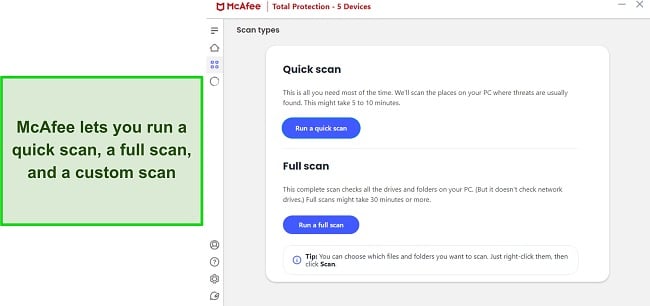
After concluding my tests, I was happy to learn that McAfee’s scans successfully detect 100% of threats. McAfee’s Quick Scan takes around 5 minutes to scan just over 10,000 items and gets rid of every single piece of malware it comes across. The Full Scan took much longer, at around 50 minutes to scan over 500,000 files, but it’s just as effective and removed 100% of malware.
ESET has more virus scanning options but is missing a Quick scan. Scan options include:
- Full scan — Checks all files on your device, and ESET’s full scan only took 30 minutes.
- Custom scan — Allows you to choose specific files to scan for malware.
- Removable media scan — This option will scan all external devices connected to your system.
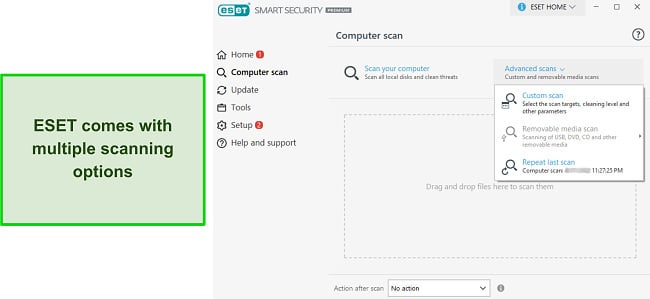
ESET’s scan speeds were faster than McAfee’s, but I noticed it scanned around 380,000 files, which is fewer than McAfee’s full scan. This is likely because ESET doesn’t scan some files that it marks safe in previous scans. Nonetheless, ESET detected 100% of malware present on my system through its scans, so I’m happy with its performance.
So, with both antiviruses successfully detecting 100% of malware in scans during my tests, they’re tied in this category.
Virus Scanner Winner: Tie
2. Real-Time Malware Protection — You Get Perfect Real-Time Protection With Both Antiviruses
I was very pleased with how good both these antiviruses are at providing real-time protection. I tested both ESET and McAfee on my system and attempted to put malware on my system, but both antiviruses successfully detected and stopped all malicious downloads.
Both antiviruses offer web protection that’ll inform you about malicious websites and protect your system from getting infected if you visit them. Also, both ESET and McAfee have a 100% detection rate against 0-day malware attacks.
McAfee uses advanced Global Threat Intelligence to deal with real-time threats. This Global Threat Intelligence is cloud-based technology that predicts how new threats will behave. It makes predictions by examining the behavior of all known malware and viruses.
Since both antiviruses are perfect at detecting malware in real-time and dealing with 0-day threats, it’s a tie in this category. However, while both provide solid protection, I consider Norton a superior choice. It not only detects 100% of malware but also offers more features and better pricing.
Real-Time Malware Protection Winner: Tie
3. System Performance — McAfee Leaves a Smaller Footprint on System Resources
Both ESET and McAfee don’t have enough of an impact on system performance to slow your PC down, but I found in my tests that McAfee is much lighter overall. The biggest difference I noticed is that McAfee barely used my CPU while idle, while ESET’s CPU usage sometimes spikes past 30%, even while idle.
When running scans, both antiviruses start using more system resources but still not enough to significantly slow down your system. ESET’s disk utilization during scans surpassed 400MB/s on my system, while McAfee’s maximum was around 350MB/s.
So, while neither antivirus consumes enough resources to impact system performance significantly, McAfee still comes ahead.
System Performance Winner: McAfee
4. VPN — McAfee Offers a VPN While ESET Doesn’t
McAfee is the only antivirus out of these two with a VPN, and its VPN impressed me a lot during my tests. McAfee’s VPN is built into the app, and you can easily navigate to it, select a server, and connect within a few seconds.
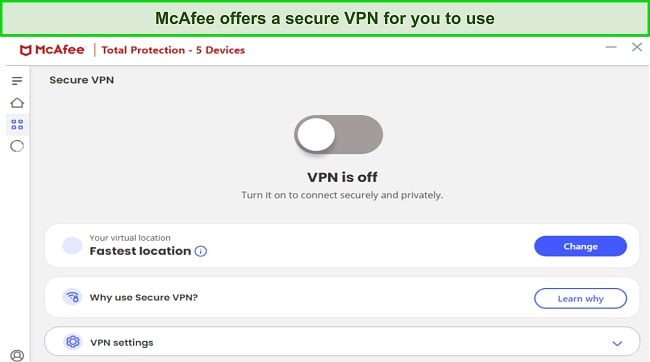
McAfee’s VPN delivered great performance throughout all of my tests. I connected to multiple services and got fast speeds across all of them, including long-distance servers. I experienced a 15% drop in download speeds and a 15% to 50% drop in upload speeds depending on the server.
I asked my colleague in the US to assist in testing it for streaming and they could easily stream their home Netflix in HD.
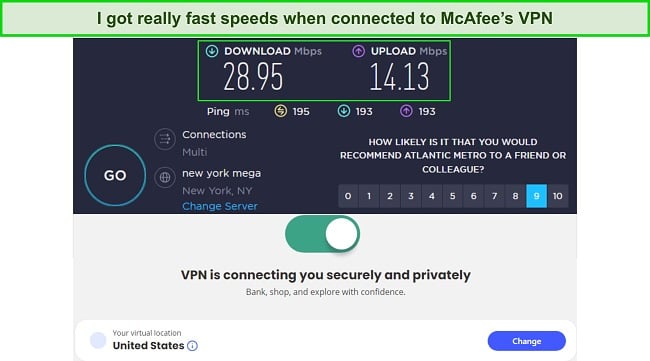
Overall, I was very happy with the fast speeds and industry-standard encryption McAfee’s VPN offers. It’ll let you browse the web without slowdowns while keeping your activity secure and anonymous.
VPN Winner: McAfee
5. Parental Controls — McAfee’s Parental Controls Offer More Features
Both of these antiviruses offer parental controls, but I was much more impressed with what McAfee’s controls have to offer. While you can use both antiviruses’ parental controls to set limitations on what your children can access online, McAfee’s parental control suite offers much more control.
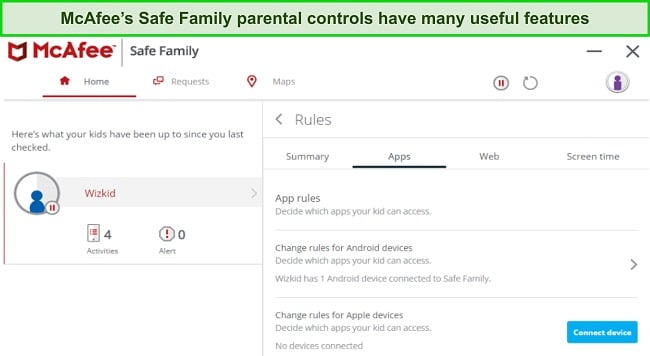
Once you’ve set McAfee Safe Family up on your own and your children’s devices, you can use it to track their activity and decide what apps they can use. You can easily block any apps you want with just a few clicks and can even set restrictions on specific websites or entire categories. Safe Family also sets some limits automatically depending on your kid’s age.
McAfee’s Safe Family parental controls also let you track your children’s location and their overall screen time. If you ever feel like your kids are getting too much screen-type, you can simply lock them out with the press of a button.
ESET’s controls work well, but they’re pretty basic. You can use ESET’s parental controls to block certain websites or entire categories of websites, but that’s pretty much all you can do. You can’t use them to monitor your children’s screen time and do the various other things McAfee can do, so McAfee wins here.
Parental Controls Winner: McAfee
Try McAfee’s parental controls
6. Firewall — You Can Easily Customize McAfee’s Secure Firewall
Both antiviruses provide secure firewalls to safeguard your online activity, but McAfee’s firewall feels much more intuitive. You can easily access it through the Firewall option in the My Protection menu and configure it to your liking.
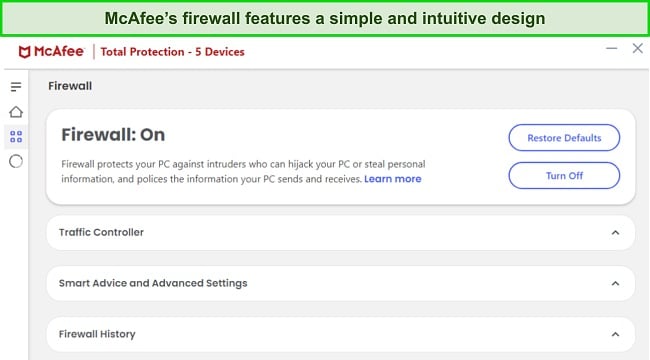
What I like most about McAfee’s firewall is its simple design. It neatly presents all the firewall’s settings, and I could easily configure them. You can easily set up new rules, block apps from making connections, open ports, and customize any other settings to your liking.
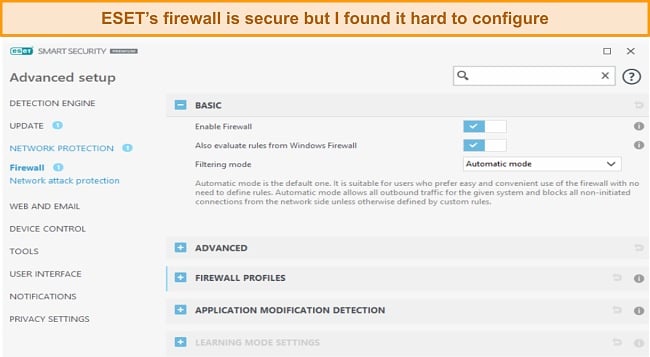
ESET’s firewall is equally as secure as McAfee’s but not nearly as easy to use. It has a somewhat outdated interface, and the basic settings are easy to access, but it’s challenging to configure the advanced settings.
Overall, I found it much easier to fine-tune McAfee’s firewall, so it’s safe to say it wins this category.
Firewall Winner: McAfee
7. Password Manager — Both Antiviruses Offer Impressive Password Managers
I was happy to discover that you get a robust password manager with both ESET and McAfee. Both password managers offer safe storage for all sorts of sensitive information like logins, addresses, cards, identities, and more.
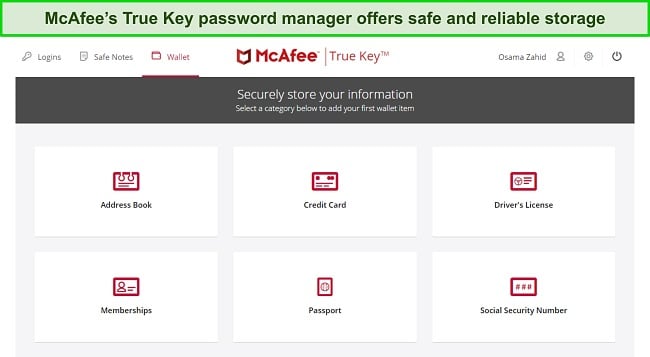
McAfee’s True Key password manager impressed me greatly in my tests. It’s completely safe and uses AES 256-bit encryption to safeguard any information you store on it. I easily used True Key to save various kinds of sensitive information, and it automatically captured any logins I used on the web.
True Key also comes with a secure password generator and auto-fill functionality that’ll help save you a lot of time. There’s also two-factor authentication to help you further secure any sensitive data you keep on it.
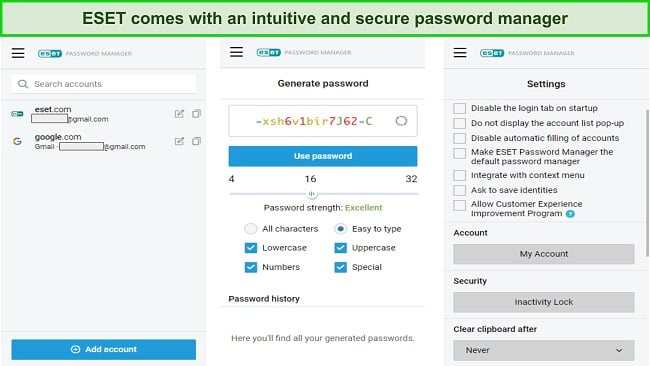
ESET’s password manager is just as reliable as McAfee’s, so it’s a great way to save any sensitive information like logins, cards, and identities. It comes with a built-in password generator, auto-capture and auto-fill functionality, and a secure password generator.
ESET’s password manager also uses AES 256-bit encryption to secure any information you store on it. Plus, you can add another layer of security by setting up two-factor authentication.
One difference between both password managers is that I couldn’t find a leaked password checker or password auditing feature in McAfee’s True Key. Both these features come with ESET’s password manager, so I have to give it the win here.
Password Manager Winner: ESET
8. Gaming Mode — ESET Comes With a Built-in Gaming Mode While McAfee Doesn’t
ESET is the only antivirus between these two with a gaming mode. Something odd about ESET’s Gamer mode is that it’s hidden in the Computer protection section, which doesn’t make a lot of sense. So, it can be a bit confusing to find at first.
Even after you’ve found and enabled it, ESET’s Gamer mode doesn’t offer much of a performance benefit. In my tests, the most it did was silence notifications, so I wasn’t disturbed during gaming sessions. My system’s gaming performance remained pretty much the same as it always is, even with this mode turned on.
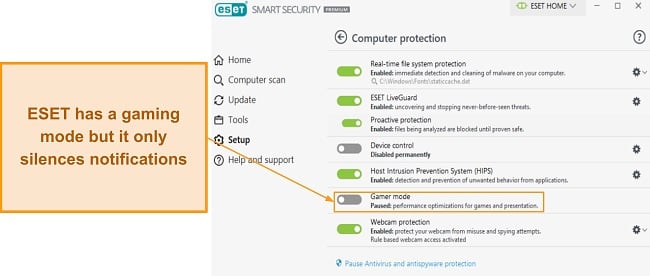
McAfee doesn’t even have a gaming mode for you to use. I found this a little odd since most high-end antiviruses nowadays have one, so I contacted its customer support to ask about this. McAfee’s customer support confirmed that the antivirus doesn’t come with a gaming mode.
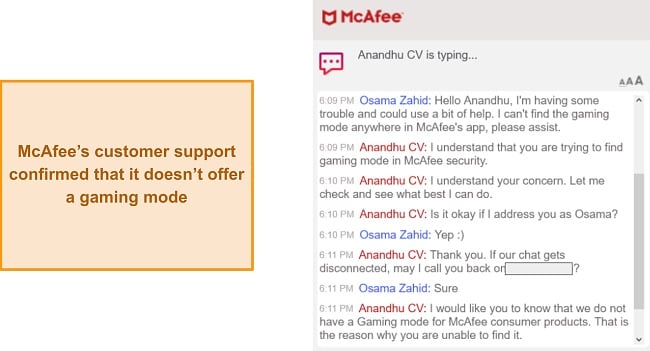
All things considered, ESET comes out ahead here because McAfee doesn’t even offer a gaming mode. For what it’s worth, though, McAfee consumes fewer resources while idle than ESET does, which should help while gaming with it.
Gaming Mode Winner: ESET
9. Optimization Tools — McAfee’s Optimization Tools Offer a Noticeable Performance Improvement
McAfee is much better than ESET if having solid optimization tools is a priority for you. I found that it has multiple tools that you can use to speed up your system’s overall performance, and these tools are effective as well.
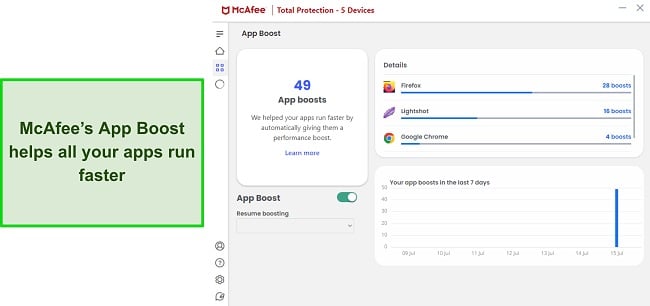
I was particularly impressed with McAfee’s App Boost, which automatically figures out how to best distribute your system’s resources to apps, so they run faster. McAfee’s App Boost automatically figures out which apps you use most frequently and optimizes them so that they launch quicker and run smoother.
McAfee also offers a Web Boost feature that stops auto-playing videos on websites from running. Doing so allows Web Boost to save data, load pages faster, and even save battery if you’re on a laptop.
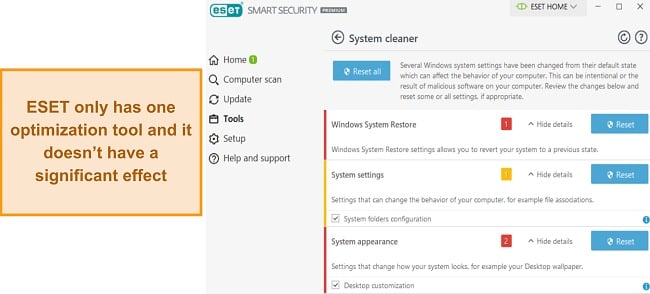
ESET only has one optimization tool, which isn’t effective at all. It offers the System cleaner tool, which only suggests setting a restore point, some appearance changes, and some system setting changes. These settings won’t affect your system’s performance noticeably, so I prefer McAfee when it comes to system optimization.
Optimization Tools Winner: McAfee
Test McAfee risk-free for 30 days
10. Other Features — McAfee Is the Better Choice if You Prefer a Feature-Rich Antivirus
McAfee is a much better option if you prefer to have a feature-rich antivirus. It isn’t the most feature-packed antivirus available, but its variety of additional functions greatly impressed me in my tests.
McAfee’s features are designed to help further secure your system and enhance its performance. It offers the McAfee Web Advisor, a browser extension that can help keep you away from malicious websites and threats on the web. There’s also a tracker remover to eliminate cookies and other temporary files that can track you online.
Other McAfee features include the App Boost, which helps apps run faster. Also, there’s Web Boost which stops auto-playing videos to help speed up browsing and save some of your data.
Finally, McAfee offers a File Shredder which you can use to delete files securely, so no one else can access them.
How To Use McAfee’s File Shredder on Your PC
- Open the McAfee app — Launch McAfee’s app to open the file shredder.
![Opening McAfee's app]()
- Open the My Protection menu — Click on the My Protection menu in the sidebar to access the file shredder.
![Opening the My Protection menu in McAfee]()
- Scroll down and open McAfee’s File Shredder — Scroll down in the My Protection menu to find the File Shredder.
![Opening McAfee's File Shredder]()
- Shred your files — Select the folder you want to shred, pick a shred type, and click on Shred to start the process.
![Picking what to shred using McAfee's File Shredder]()
That’s all there is to it! Following these steps will let you securely shred files you don’t want anyone else to access.
Compared to McAfee, ESET doesn’t have that many features. ESET comes with an anti-theft feature to help you track any stolen devices and a network security monitor that helps secure your network. Unfortunately, there’s not much else other than this.
Since McAfee offers a larger variety of features, it’s the winner in this category.
Other Features Winner: McAfee
Try McAfee’s extra features risk-free
11. Device Compatibility — McAfee Supports a Wider Range of Platforms
While both McAfee and ESET work on a wide variety of devices, I learned in my tests that McAfee works on a wider range of platforms. ESET and McAfee come with native apps for Windows, Android, and macOS, but McAfee is the only choice here that supports iOS.
The following table shows a list of the different platforms you can use these antiviruses on:
| McAfee | ESET | |
| Windows | 8 and above | 7 SP1 and above |
| macOS | 10.15 and above | 10.12 and above |
| Android | 8 and above | 5 and above |
| iOS | iOS 13 and above | ✘ |
Even though ESET supports more versions of Windows, macOS, and Android, McAfee still comes out on top because it works on iOS. So, it’s safe to say that it wins in this category. If you want to consider antivirus options that you can use on iOS, though, these are the best antiviruses that can protect your iOS devices.
Device Compatibility Winner: McAfee
Test McAfee risk-free on your devices
12. Customer Service — McAfee’s Support Is Available Whenever You Need It
Both antiviruses offer prompt customer support that I was very impressed with during my tests. ESET and McAfee have live chat, email support, an online knowledge base, and a community forum that you can use for assistance.
I tested both antiviruses’ various support channels to see which one offers the better experience and was pleasantly surprised. Both antiviruses offer responsive email support that’ll get back to you in a day or two with detailed responses to all your queries. Plus, ESET’s knowledge base and McAfee’s knowledge center are both great resources to get help with common questions.
Live chat is where I feel McAfee is the better option. I easily reached out to a support agent via live chat through McAfee’s website and connected in minutes. I asked multiple questions and received helpful resources for each one, so I was very pleased with my experience.
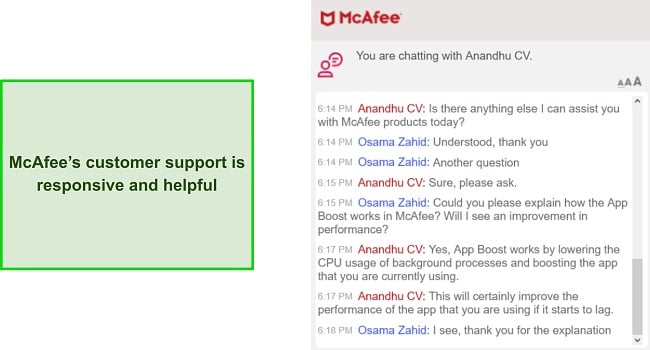
ESET offers great live chat as well, but the key difference is that it’s only available during an 11-hour window from Monday to Friday. McAfee’s live chat, on the other hand, is available 24/7, so it’s clear who the winner is.
Customer Service Winner: McAfee
13. Price — You Get Far More Value for Your Money With McAfee
ESET and McAfee offer a variety of plans you can subscribe to. Both antiviruses offer reasonable packages for the price, but I found that McAfee’s plans offer a lot more value for money. McAfee offers the following plans:
- Antivirus Plus — Antivirus Plus includes basic virus scanning capabilities and web protection.
- Basic — This plan offers the antivirus’ basic virus scanning capabilities, firewall, password manager, file shredder, and VPN.
- Premium — Premium comes with all of Basic’s features and protects up to 5 devices simultaneously
- Advanced — The Advanced plan offers all of Premium’s features and much more, including identity theft coverage, lost wallet protection, and security freeze. This plan also lets you secure up to 5 devices at once.
ESET’s primary plans, on the other hand, include the following:
- ESET NOD32 Antivirus — This is ESET’s most basic plan and comes with crucial antivirus features like virus scanning and removal for Windows and macOS.
- ESET Internet Security — Internet Security includes all of NOD32’s features and also adds network protection and boot-time scanning.
- ESET Smart Security — Smart Security is ESET’s most premium plan that includes all of Internet Security’s features and adds ESET’s password manager.
One thing that sets the two antiviruses apart here is that McAfee’s higher-end plans protect up to 5 devices simultaneously. ESET, however, supports only 1 device per plan, and you’ll have to pay extra to use it on additional devices. Also, all McAfee’s plans work on all supported devices, while ESET’s NOD32 only works on Windows and macOS. So, McAfee simply offers far better value for money.
Price Winner: McAfee
Try McAfee risk-free for 30 days
14. Free Trial — Both Antiviruses Offer a 30-Day Free Trial
If you want to test either antivirus without buying anything, you’ll be happy to know that both ESET and McAfee come with a free trial. The free trials let you test the antiviruses’ full suite of features completely risk-free. Both trials are 30 days long as well, which is plenty of time to fully test an antivirus to see if it’s right for you.
One major difference, though, is that ESET’s free trial feels a lot easier to set up and use. You don’t need a credit card, so simply download ESET’s setup, install the antivirus, and make your ESET account. After this, you’ll have a month to try all its features.
However, McAfee’s free trial requires a credit card and is more difficult to set up. I tried using McAfee’s free trial but couldn’t because it didn’t accept any of the multiple cards I used. With this in mind, I consider ESET the winner here.
Free Trial Winner: ESET
Try ESET risk-free for 30 days
15. Money-Back Guarantee — Both Antiviruses Offer a 30-Day Money-Back Guarantee
I was pleased to learn that both ESET and McAfee have a money-back guarantee. You can use this money-back guarantee to fully test either antivirus before you decide to commit to a full purchase. So, if you buy either of these antiviruses and feel unsatisfied with their services during the guarantee’s time period, you can easily get a refund.
My experience getting a refund from McAfee was quite smooth. I contacted customer support through the website, requested a refund, and chose “Other” as the reason. Shortly after, I was contacted over the phone by a support agent who confirmed if I wanted the refund and processed it. Afterward, it took around 7 business days to get the money back into my account.
ESET’s refund process is straightforward and easy as well. I sent an email to customer support asking for a refund and received a response in 2 days confirming that my refund was approved. The email response said I’d have my money back in 3 to 5 working days, but I had it back in my account a day later.
All things considered, since both antiviruses offer a 30-day-long money-back guarantee and fully live up to it, it’s a tie here. It’s worth mentioning, though, that Norton offers a much longer 60-day money-back guarantee, so it’s the best option if you want a longer period to test out a product.
Money-Back Guarantee Winner: Tie
And the Winner Is… McAfee
While you can use either antivirus to safeguard your system from threats and malware successfully, I consider McAfee the overall winner. With its impressive threat protection, better optimization features, built-in VPN, and more, it’s simply the better choice.
- Virus Scanner — Tie
- Real-Time Malware Protection — Tie
- System Performance — McAfee
- VPN — McAfee
- Parental Controls — McAfee
- Firewall — McAfee
- Password Manager — ESET
- Gaming Mode — ESET
- Optimization Tools — McAfee
- Other Features — McAfee
- Device Compatibility — McAfee
- Customer Service — McAfee
- Price — McAfee
- Free Trial — ESET
- Money-Back Guarantee — Tie
In conclusion, both McAfee and ESET impressed me a great deal as far as security is concerned. Both antiviruses successfully detected and removed all malware during scans and are equally effective at providing real-time protection.
Nonetheless, while both offer solid protection, I feel that McAfee is the superior overall choice. McAfee simply has much more to offer than ESET, including a VPN, optimization tools, thorough parental controls, and support for up to 5 devices on its premium plans.
ESET might not be the most feature-rich option, but it’s still a good choice for anyone looking for a solid antivirus with reliable security. If you only need to secure a single device and want an antivirus that’s simple and effective, ESET can be a worthwhile option.
If you’re still unsure which antivirus is the best for you, you can go ahead and try them both risk-free yourself. ESET comes with a 30-day money-back guarantee, so you’ll have a full month to try it out. McAfee also has a 30-day money-back guarantee, so you can also test it without risk for an entire month.
Overall Winner: McAfee
Try McAfee risk-free for 30 days
FAQs About ESET and McAfee
Is ESET as good as McAfee?
No, while both antiviruses are excellent, McAfee is the better choice. It’s more feature-rich, offers a more customizable firewall, works on more devices, and offers better customer support. ESET also has its strengths, like its affordable pricing, but McAfee wins between these two options.
Is McAfee the best antivirus?
No, even though McAfee is a great antivirus with many strengths, it’s not the best overall antivirus. If you’re looking for the best possible antivirus, Norton is the right choice.
Norton offers best-in-class malware detection through scans and in real-time. Plus, it offers a built-in VPN, parental controls, and many more features that provide extra layers of security.
Can I use ESET or McAfee for free?
Yes, while neither antivirus offers a free plan, both ESET and McAfee come with a free trial. One key difference is that McAfee’s free trial requires a credit card, while you can use ESET’s free trial by simply signing up with your email.
Top 5 Antiviruses in 2024
Editors’ Note: Private Internet Access, CyberGhost, Intego and Expressvpn are owned by Kape Technologies, our parent company.

